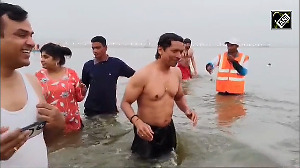When Vietnam Prime Minister Nguyentan Dung begins his maiden to India on July 4 with a trip to Kolkata, it will underline the "special relationship" between his country and West Bengal and Hanoi's desire for enhanced cooperation with the eastern Indian state.
"We have very special and traditional relationship between Ho Chi Minh City (previously Saigon) and West Bengal.
It started from the early days of our national struggle and the support the people of West Bengal gave us all through," said Nguyen Thanh Tai, Vice Chairman of People's Committee of this commercial hub of Vietnam.
Vietnam had fought French colonial rule between 1945 and 1954 and then the American occupation troops till 1975 when the Southeast Asian country emerged victorious.
"When we went through the hardships of war, we got support from the people of West Bengal", Than Tai said pointing out that a key street in downtown Kolkata is named after late Vietnam President and legendary Communist leader Ho Chi Minh and a bust of his is installed in a nearby area.
The commercial significance of Ho Chi Minh City could be measured from the fact that the city contributes one third of Vietnam's total budget.
The city, reduced to almost rubbles during the war against the American troops, was rebuilt by Vietnam's Communist government.
With its silky roads, plush squares, skyscrapers, luxurious hotels, casinos, night clubs, bars and multinational retail giants' outlets like Gucci, Louis Vuittion and Kentucky Fried Chicken, Ho Chi Minh city looks like a metropolis in the US or western Europe.
Than Tai said Ho Chi Minh City would like "enhanced cooperation" with West Bengal.
Before 1975, the city had several thousand Indians as its residents but most of them had left due to the war between Vietnamese guerrillas and American troops, he said adding the number of Indians now in the city is very small.
Saigon was the headquarters of the US-backed South Vietnam government during the war years when the country was divided into Southern and Northern parts.
Yet the city with a population of eight million is not without its problems.
Than Tai said the physical infrastructure of the city, which is growing fast and attracts a sizable migrant population, needs to be improved further to attract more domestic and foreign investors.
The pace of industrialisation has led to a pressure on agriculture land, sent land prices soaring and causing food, housing and environmental problems, he said.
Secondly, the human resource development of the city is not up to the desired level and thirdly the government machinery needed to be reformed with the easing of procedural complications.






 © 2025
© 2025